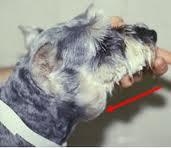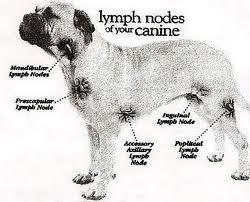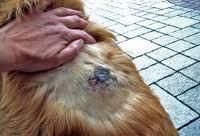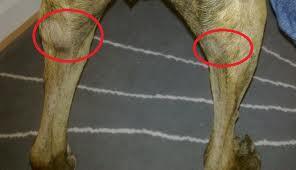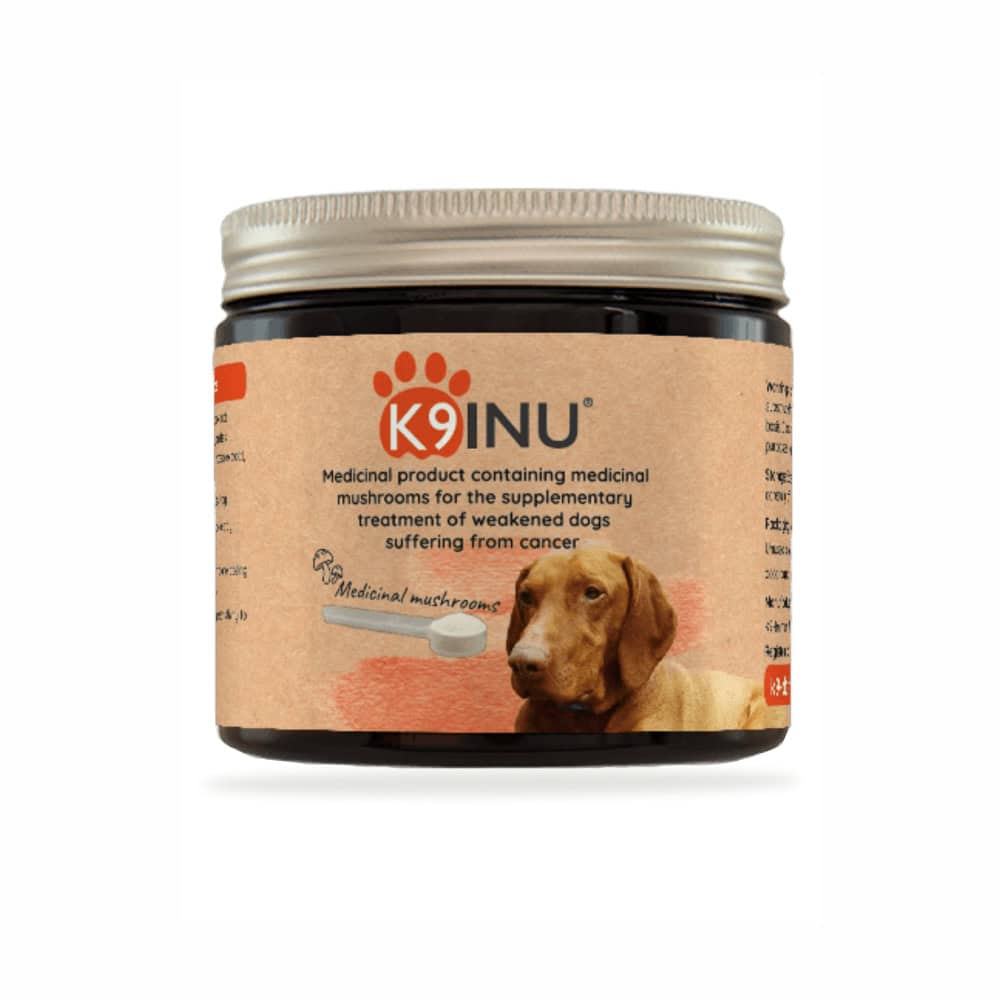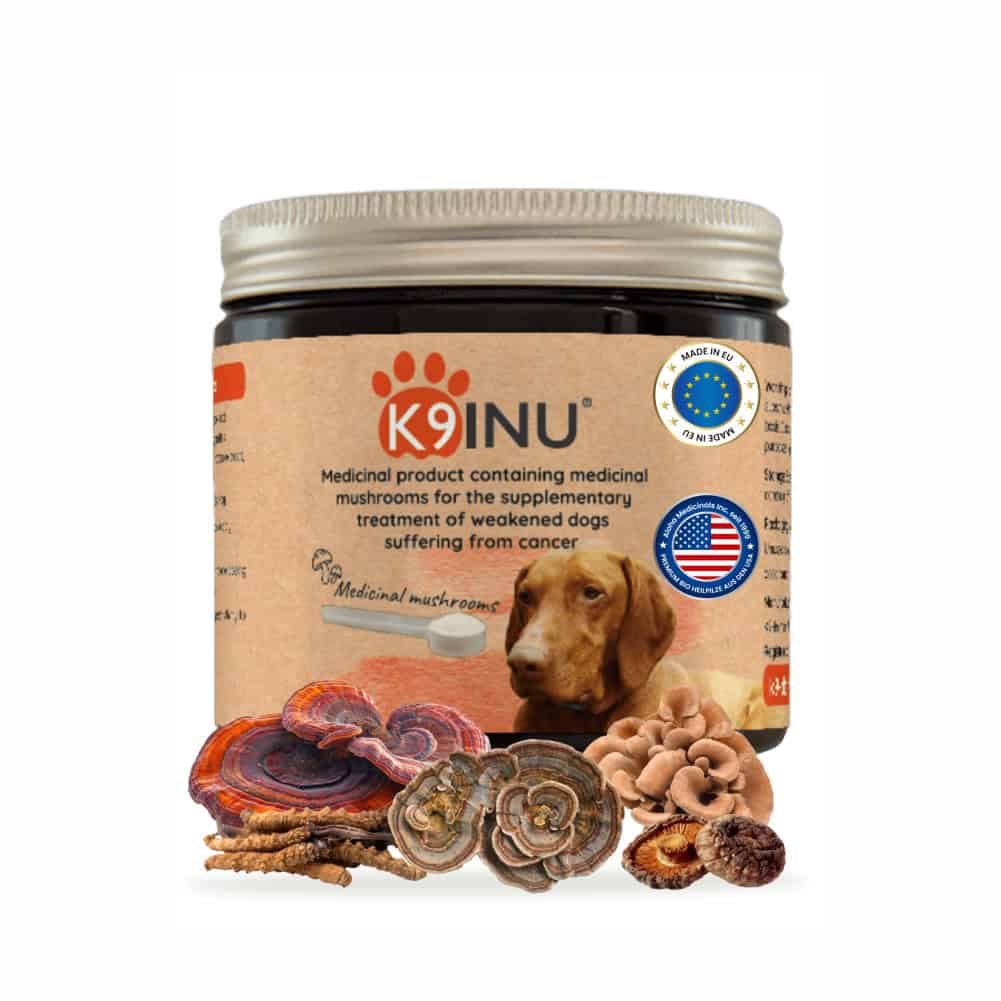Lymphoma is a relatively common cancer in dogs, but in most cases it is treatable. Most types of dog lymphoma respond well to a combination of conventional treatment – such as chemotherapy – and some type of immunomodulatory (immune-boosting) therapy, such as K9 INU®.
Among otherwise healthy dogs, lymphoma carries one of the highest chances of recovery compared to other cancers. Up to 50% of dogs with lymphoma can achieve complete remission.
What is lymphoma in dogs?
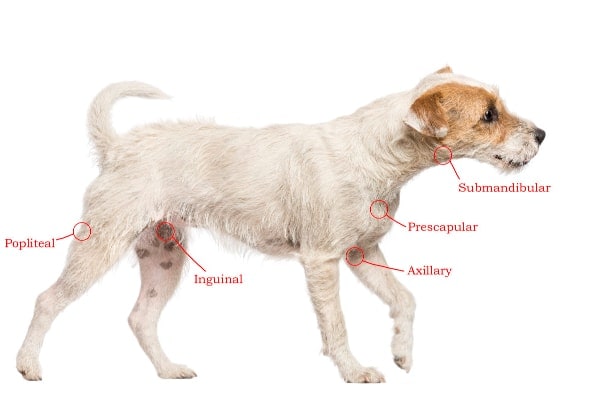
source: vet.purdue.edu
The lymphatic system is often referred to as the body’s “second” circulatory system. It consists of a network of vessels, channels, lymph nodes, and lymphoid organs spread throughout the body, and therefore it plays a vital role in maintaining health. Moreover, its main function is to circulate lymph, which contains lymphocytes – the white blood cells that destroy invading microorganisms and foreign substances.
Organs of the lymphatic system filter out invaders from the lymph and prevent them from spreading. The lymphatic system, or lymphocytes, is actually the body’s primary defense against infection.
In healthy dogs, these cells (lymphocytes) are formed in the bone marrow, go through a life cycle of approximately 30 days, then die and are either absorbed or eliminated with the waste products.
In lymphoma, the lymphocytes start to behave like cancer cells, not dying sufficiently or growing and dividing uncontrollably.
Abnormal lymphocytes accumulate in the lymph nodes, causing swelling. Because lymphocytes are present throughout the entire body, lymphoma can develop not only in the lymph nodes but also in other organs. The most common sites are the spleen and bone marrow, but lymphoma may also occur in the stomach, liver, or more rarely, the brain. In many cases, the disease affects several organs at the same time.
What are the symptoms of dog lymphoma?
The symptoms of lymphoma are related to the location of the tumor(s) within the body. Lymphoma is generally characterized by a high white blood cell count, swollen lymph nodes, and lethargy. Depending on the tumor’s location, symptoms may include loss of appetite, vomiting, diarrhea, weight loss, or shortness of breath. Additional signs can be muffled heart sounds, itchy red bumps, boils on the skin, or in the mouth.
Which dog breeds are prone to lymphoma?
Lymphoma is unfortunately one of the most common cancers in dogs, and studies show that certain breeds have a significantly higher genetic predisposition. According to veterinary research (Dobson, 2013), the following breeds are at increased risk:
While these breeds are more frequently diagnosed, lymphoma can occur in any dog, purebred or mixed. Environmental influences, age, and overall immune system health also play an important role in its development.
-
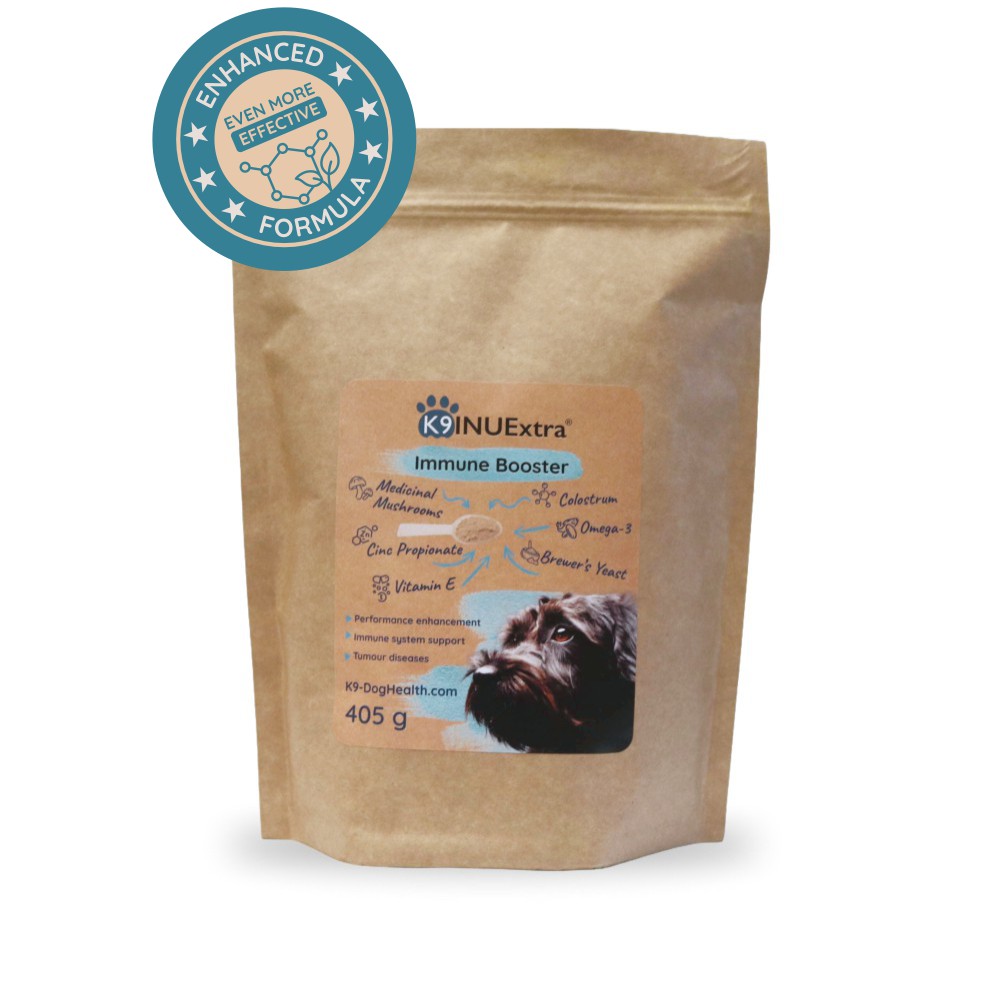

K9 INUExtra®
- Premium immune support with medicinal mushrooms and colostrum
- Anti-inflammatory support with curcumin, omega-3 and BioPerine
- Stronger gut flora and improved digestion with brewer’s yeast and targeted prebiotics
- Antioxidant cellular protection with vitamin E, zinc and natural active compounds
€64,93 (ex.VAT)
Cancer is often the result of an immune system dysfunction.
Dog lymphoma and immunomodulatory therapy
Lymphosarcoma (lymphoma) develops when the immune system fails to recognize abnormal lymphocytes as invaders and allows them to proliferate unchecked.
Traditional Asian medicine, and more recently modern medicine, have long used natural compounds in cancer treatment, because these substances aim to correct improper immune system functioning. In other words, they do not attack the tumor directly, but rather support the body so it can fight back more effectively.
Immunomodulatory compounds stimulate the immune system, and as a result it learns again to recognize abnormal cells. Thanks to this process, the body can mount an appropriate immune response, and therefore ‘re-learn’ how to destroy cancerous cells more efficiently.
Immunomodulatory agents are not the same as conventional anti-tumor drugs such as chemotherapy!
Chemotherapeutic agents
are toxic and their job is to destroy cancer cells. They are very useful in the fight against cancer because they significantly reduce the number of degenerated cells in the body, but they do not address the root cause of why the body has allowed them to proliferate.
In contrast, immunomodulatory agents
are non-toxic, their main active ingredients being naturally occurring compounds (in our food) called heteropolysaccharides, which are needed by all mammals for proper immune function.
What are the treatment options for lymphoma in dogs?
Chemotherapy for lymphoma
The primary treatment for lymphoma in dogs is chemotherapy. As this type of tumor is most likely to attack otherwise healthy young and middle-aged dogs, they are usually better able to tolerate aggressive chemotherapy. Of course, several factors largely determine the outcome of the treatment, including the size of the tumor area, the extent of any metastasis, and the major organs involved. Surgeons usually remove the affected lymph node, although the effectiveness of this procedure alone remains debatable. After surgery, they typically administer some form of chemotherapy to target any remaining tumor cells. Surgery and chemotherapy are effective in removing most of the tumor, but this is only half of the healing process. These interventions do not cure the cancer, they do not correct the immune system dysfunction that allowed the tumor cells to develop.
When surgery and chemotherapy remove most of the tumor cells causing damage, the dog’s condition improves significantly. Adding immunomodulatory therapy (K9 INU® and K9 INUFactor®) activates the immune system. This combination greatly increases the chances of beating lymphoma and living a normal life.
What is immunomodulatory therapy for dog lymphoma?
Strengthening the immune system is essential in cancer (Brain tumors in dogs, Osteosarcoma, Mast cell tumor, Hemangiosarcoma, Mammary tumor, etc.) or any other disease resulting from an immune disorder! Until the body reacts to the disease on its own, there is no real cure, only symptomatic treatment.
Therefore, many veterinarians emphasize that while treatment may extend a dog’s life, the tumor often remains.
This type of cancer (lymph node tumor) responds very well to the combination of chemotherapy and immunomodulatory therapy!
How well a dog responds to immunomodulatory therapy is difficult to generalise. The success of the treatment depends on a number of factors, such as the age of the dog, diet, medical history, location and extent of the tumor and which organs are affected.
In general, the earlier a diagnosis is made, the better the chances. Lymphoma most often occurs in middle-aged to older dogs. If detected in time, immunomodulating agents, in addition to conventional treatments, provide the best chance for recovery and prevention of recurrence.
The role of diet in dog cancer
Cancer is one of the most common causes of death in dogs. Many experts believe that the main reason for this is an improper diet. We usually feed our pets foods based on cereals, even though dogs do not naturally graze on wheat fields. Dogs do not have the enzymes to digest and utilise grain. They are basically carnivores!
When a carnivorous animal eats a grain-based diet, its body does not get (or cannot process and utilise) the nutrients it needs, there is a high risk of immune disorders, including cancer.
If inappropriate diet is indeed one of the main causes of cancer, then it is clear that a good diet is essential for dogs with cancer. In fact, proper diet is one of the most important factors in successful cancer treatment! To really give our dogs everything they need to fight cancer, we need to provide them with the right nutrients. Just because a dog food is expensive, highly recommended or has a trendy name, doesn’t mean it’s the best for a dog with cancer. For more information, read our article FEEDING A DOG WITH CANCER.
If your dog has been diagnosed with lymphoma, consult your veterinarian for the best treatment plan, and support your pet’s immune system with natural supplements to improve quality of life.
This article is for informational purposes only and does not replace veterinary consultation. Always seek advice from your veterinarian for diagnosis and treatment of your dog.
Frequently Asked Questions about Dog Lymphoma
❓ What are the first signs of dog lymphoma?
The earliest sign is usually swollen lymph nodes (e.g., under the jaw, behind the knees). Other early symptoms may include lethargy, loss of appetite, and mild weight loss.
❓ Can dog lymphoma be cured?
Lymphoma is treatable, but not always curable. Many dogs respond well to chemotherapy and immunomodulatory therapy, and up to 50% may achieve complete remission.
❓ How long can a dog live with lymphoma?
Survival time depends on the type of lymphoma and treatment. With appropriate therapy, many dogs live 6–12 months, and some achieve 1–2 years or more in remission.
❓ Which dog breeds are more prone to lymphoma?
Golden Retrievers, Boxers, Bernese Mountain Dogs, Basset Hounds, and Scottish Terriers have a higher risk, although lymphoma can occur in any breed.
❓ What is the best treatment for dog lymphoma?
The most effective treatment is a combination of chemotherapy and immunomodulatory therapy, supported by a proper diet and regular veterinary care.
More about dog cancers
- Dog bone cancer (osteosarcoma)
- Hemangiosarcoma in dogs
- Dog lymphoma
- Mast cell tumor in dogs
- Brain tumors in dogs
Worried about your dog’s health?
Learn more about our natural immune-boosting supplements to support your dog’s recovery from lymphoma. Click here if you want to read more about the symptoms of dog cancer or the connection between cancer and medicinal mushrooms. Vagy kattints ide, ha a kutyadaganat tüneteiről, illetve a daganat és a gyógygombák összefüggéséről magyarul szeretnél olvasni.
Important: This article is for informational purposes only and does not replace veterinary examination or treatment. For an accurate diagnosis and the right therapy, always consult your veterinarian.
References:
- Vail, D. M., Pinkerton, M. E., & Young, K. M. (2020). Canine lymphoma and lymphoid leukemias. In D. M. Vail, D. H. Thamm, & J. L. Liptak (Eds.), Withrow and MacEwen’s small animal clinical oncology (6th ed., pp. 688–722).
- Marconato, L., Frayssinet, P., Rouquet, N., Comazzi, S., Leone, V. F., Laganga, P., … & Aresu, L. (2019). Randomized, placebo-controlled study of active immunotherapy in 98 dogs with B-cell lymphoma. Journal of Veterinary Internal Medicine, 33(2), 602–613.
- Villamil, J. A., Henry, C. J., Hahn, A. W., Bryan, J. N., Tyler, J. W., & Caldwell, C. W. (2009). Hormonal and sex impact on the epidemiology of canine lymphoma: A retrospective study. Journal of Veterinary Internal Medicine, 23(3), 504–510.
- Vezzali, E., Parodi, A. L., Marcato, P. S., & Bettini, G. (2010). Histopathologic classification of 171 cases of canine and feline non-Hodgkin lymphoma according to the WHO. Veterinary and Comparative Oncology, 8(1), 38–49.
- Dobson, J. M. (2013). Breed-predispositions to cancer in pedigree dogs. ISRN Veterinary Science, 2013, 941275.
